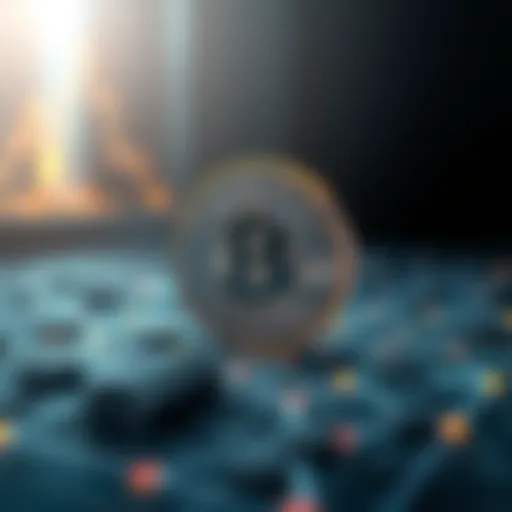Understanding NFT Mansions and Digital Real Estate


Intro
In the realm of digital assets, the concept of NFT mansions emerges as an intriguing intersection of technology and real estate. Encompassing both the allure of virtual properties and the growing interest in non-fungible tokens, the idea of owning a mansion in a digital environment raises essential questions. What are NFT mansions? How do they function within the broader context of the digital economy? These questions propel us into an exploration that reveals not just the mechanics, but also the potential that these assets hold for investors and enthusiasts.
As traditional real estate becomes increasingly inaccessible for many, the virtual landscape presents opportunities to redefine ownership. NFT mansions, as a digital representation of property, provide a unique twist on homeownership, allowing individuals to buy, sell, and trade virtual estates. This brings to the forefront a pressing consideration: how does this innovative approach mesh with our existing perceptions of value and investment in real estate? Understanding the dynamics at play can guide potential investors through the maze of digital real estate.
In this article, we’ll journey through various aspects: starting with market trends and analysis, we will witness their evolution and implications, diving into investment strategies tailored for the NFT mansion space. This will shed light on the risks and rewards that come with these intriguing digital assets, aiming to empower potential investors and crypto enthusiasts with the knowledge they need to navigate this burgeoning sector.
Prelude to NFT Mansions
The surge in popularity of non-fungible tokens (NFTs) has birthed a new dimension in the realm of digital assets, coining the term "NFT mansions." These virtual properties serve as a fusion of technology and real estate, raising a multitude of questions and opportunities for investors and digital enthusiasts alike. By digging into NFT mansions, we can better understand not just what they are, but also their implications for the future of virtual property ownership.
The concept of NFT mansions is important because it represents a shift in how real estate might be perceived and valued. Traditional properties are bound by physical limitations, whereas NFT mansions can exist in boundless virtual landscapes. This opens up a plethora of possibilities: custom designs, decentralized ownership, and even brand collaborations that wouldn't be feasible in the physical world.
Additionally, the ownership of NFT mansions gives rise to new forms of status in digital societies. It elevates the conversation around asset appreciation and diversification, allowing investors to explore a new frontier of wealth management. However, this isn't merely about investment; it also involves community engagement and cultural significance in the digital domain. As more people navigate this evolving space, understanding the nuances crucial to NFT mansions becomes essential.
Definition of NFT Mansions
NFT mansions refer to virtual properties that are represented through non-fungible tokens on blockchain networks. Unlike your typical real estate, these digital assets reside in online environments, essentially offering a place for social interaction, entertainment, or even business activities. Each NFT mansion is unique, with its design and attributes encoded in the blockchain, providing irrefutable proof of ownership. Commonly found in expansive virtual worlds like Decentraland or The Sandbox, NFT mansions can vary dramatically in style, size, and function, catering to the tastes and desires of a diverse audience.
Historical Context of NFTs
To appreciate the significance of NFT mansions, it's beneficial to look back at the rise of NFTs themselves. The journey began in the early 2010s when artists and developers started experimenting with blockchain technology to create unique digital assets. One of the landmark moments came in 2017 with the creation of CryptoKitties, a game focused on collecting and breeding virtual cats. This playful project opened the floodgates, illustrating the potential for digital scarcity and ownership
As interest grew, NFTs transcended art and collectibles, subsequently penetrating various sectors, including gaming, music, and, eventually, real estate. Each step in this evolution has laid the groundwork for understanding NFT mansions today. By examining how NFTs transitioned from simple digital collectibles to multifaceted virtual assets, we reveal the broader implications for individuals looking to invest in this burgeoning market.
"NFTs are not just a trend; they represent a paradigm shift in how we think about ownership and digital property."
The Mechanics of NFT Ownership
Understanding the mechanics of NFT ownership is essential for anyone looking to delve into the realm of digital real estate, particularly when it comes to NFT mansions. This section aims to highlight the core components, benefits, and considerations tied to owning such virtual properties. What sets NFT ownership apart from traditional property ownership is primarily the way it intertwines with blockchain technology, creating unique opportunities and challenges for investors.
How NFTs Work
Non-fungible tokens, or NFTs, represent digital assets on a blockchain. Each NFT is unique, encapsulating ownership details, history, and value in a manner that is easily verifiable. Unlike cryptocurrencies, which are fungible and can be exchanged for one another, NFTs bring individuality to the digital landscape, providing a distinctive identity to every token.
- Creation of NFTs: NFTs are created through a process called minting. An artist, developer, or individual can upload their digital property to a marketplace or platform that supports NFT creation. This action transforms the property into a unique token, recorded on the blockchain.
- Ownership Transfer: When an NFT is bought or sold, the ownership information is updated on the blockchain. This ensures that everyone can trace the NFT’s lineage to its current owner, establishing a clear ownership history, much like a deed in traditional real estate.
- Smart Contracts Role: Smart contracts are pivotal in NFT transactions. They automate the transfer of ownership when predefined conditions are met, eliminating the need for intermediaries. This technology is designed to offer transparency and security, bridging the gap between the buyer and seller.
In essence, the way NFTs work allows for a seamless transaction experience, excising traditional real estate complexities while inviting a digital twist.
Blockchain Technology Explained
At the heart of NFTs lies blockchain technology—a decentralized and distributed ledger system that records transactions securely across multiple computers. This technology is not merely a fad; it is a fundamental change in how transactions can be conducted.
- Decentralization: Traditional asset ownership often relies on centralized authorities, like banks or government institutions, creating single points of failure. Blockchain flips this paradigm, distributing control and making it exceedingly difficult to manipulate data.
- Security: Each transaction is cryptographically secured. Once a transaction is recorded on the blockchain, altering it is nearly impossible, ensuring the authenticity of NFT ownership.
- Transparency: Since the blockchain ledger is public, everyone can view transactions, providing a clear perspective on an asset’s history. This transparency builds trust among buyers, sellers, and potential investors.
Furthermore, the implications of blockchain transcend just security and transparency. They affect the economic dynamics of NFT ownership, allowing for a liquid market where assets can be traded globally, with relatively low barriers to entry.
"The future of ownership is digital. Understanding NFTs is the first step into this new reality."
For further reading, consider visiting Wikipedia's page on Blockchain and Britannica on NFTs.
NFTs present a unique investment opportunity that can redefine the concept of ownership as more individuals become familiar with the underlying technology.
The Appeal of Virtual Real Estate
Digital real estate is not just a quirky novelty; it captures the intersection of technology, investment, and cultural phenomena in the 21st century. The appeal of virtual properties, particularly NFT mansions, has drawn eyes from investors and crypto enthusiasts alike. These digital spaces offer unique avenues for profit, expression, and community engagement. Understanding the merits of NFT mansions can illuminate their role in shaping the future of real estate.
Investment Value of NFT Mansions
NFT mansions represent more than mere pixels on a screen; they are assets that can appreciate in value, much like traditional properties. Investors keen on the cryptocurrency boom have realized potential profits from their investments in these digital homes. The volatility of the crypto market can be daunting, yet savvy investors see this as an opportunity for higher returns compared to conventional assets.
Some notable reasons why NFT mansions hold investment value include:


- Scarcity: Every NFT mansion is unique, underpinned by blockchain technology ensuring ownership and provenance. This creates a sense of exclusivity that can drive prices up.
- Market Growth: The demand for virtual properties is skyrocketing. As more firms enter the metaverse, the hunger for aesthetically striking and desirable virtual spaces will grow.
- Liquidity: Unlike physical properties, NFT mansions can be bought or sold quickly within digital marketplaces, providing relative ease in cashing out.
"Investing in NFT mansions is like getting in on the ground floor of a tech revolution; the early bird might just catch the worm."
However, with potential rewards come risks. Factors like market sentiment, technological change, and regulatory frameworks can influence prices. Investors need to conduct thorough research and embrace caution while dabbling in this novel sector.
Cultural Significance of Virtual Properties
The rise of NFT mansions opens doors to discussions about ownership, identity, and community in the digital age. They symbolize a shift in how society perceives value and property. In many ways, virtual properties serve as status symbols, akin to prestigious physical real estate. The individuals and brands involved in acquiring and building these properties often reflect broader cultural trends in society.
Some aspects of cultural significance include:
- Identity and Expression: NFT mansions allow owners to express their individuality in a digital form. Customizing virtual spaces can showcase personal taste, much like decorating a physical home.
- Community Building: These properties often foster communities around shared interests—gaming, art, or even virtual events. This sense of belonging can have meaningful social implications, deepening connections among owners and visitors.
- Art and Culture: The digital space empowers artists and creators to monetize their work far beyond traditional galleries. NFT mansions can host art exhibitions or performances, allowing for new forms of artistic expression and engagement.
As we navigate through the complexities of a digitized world, the cultural significance of virtual properties becomes increasingly prominent. NFT mansions transcend mere real estate— they reflect evolving narratives around identity, value, and community in the ever-expanding digital landscape.
Platforms for Buying and Selling NFT Mansions
Navigating the world of NFT mansions requires understanding the different platforms where these digital properties can be bought and sold. These marketplaces enable transactions and allow users to explore various digital real estate options. Knowing where to look is as crucial as knowing what to look for, especially in this constantly evolving ecosystem.
Leading Marketplaces for NFT Real Estate
When we're talking about the leading marketplaces for NFT real estate, a couple of key players pop up. Platforms like OpenSea and Rarible are often at the forefront due to their user-friendly interfaces and extensive collections of NFTs. They cater to a range of digital assets, including virtual properties.
- OpenSea: This marketplace is like the bustling bazaar of NFTs. It boasts one of the largest collections of digital art, collectibles, and yes, even virtual real estate. Users can buy, sell, and trade a variety of NFT mansions, with options to bid at auctions or buy immediately.
- Rarible: Rarible has made a name for itself as a decentralized marketplace that allows creators to mint their own NFT mansions. It emphasizes community governance, where users can vote on platform upgrades and future developments.
- Decentraland Marketplace: Dedicated to a virtual world where users can buy, sell, and trade parcels of land, this platform is tailored for those specifically interested in virtual property. Here, NFT mansions are not just buildings but part of a living, breathing community.
Using these platforms involves more than just a simple transaction. Users should also consider aspects like gas fees, platform reliability, and user support. Each platform comes with its own unique features, which means that understanding them can give investors significant leverage in the long run.
Evaluating Market Trends
Studying market trends in the NFT mansion space helps potential buyers and sellers to get a grasp on what’s hot and what’s not. It's not just about choosing the right platform, but also about understanding the fluctuations in values and the general sentiment around digital real estate.
- Price Fluctuation: Values can soar or plummet based on market demand, news about cryptocurrency, or changes in technology. Thus, keeping an eye on sales data and statistics from reliable sources like DappRadar can aid you in making informed decisions.
- User Engagement: Social platforms such as Twitter or Discord often provide insights into community sentiment. Watching discussions around NFT mansions can reveal what aspects are currently garnering attention, either positively or negatively.
- Speculative Investment vs. Long-Term Holding: It’s vital to recognize whether the current trend reflects a speculative bubble or a sign of sustainable growth. Sometimes, trends can feel like a flash in the pan. Analyzing past sales and projected future developments may offer clarity on whether to dive right in or sit tight for a while.
In summary, understanding marketplace dynamics and evaluating trends are essential steps for anyone looking to enter the NFT mansion market. Discipline and strategy can mean the difference between landing a deal that appreciates or watching your investment dwindle.
Legal Considerations in NFT Acquisitions
In the rapidly evolving landscape of NFT mansions, understanding the legal frameworks surrounding acquisitions is critical. These digital assets exist not just as items for collection or investment but are also entwined with a myriad of legal implications that can significantly impact ownership rights and overall market engagement. As the lines between digital and physical property blur, the legal underpinnings become increasingly complex and essential for both seasoned investors and newcomers alike.
The importance of these legal considerations cannot be overstated. Investors who proceed without proper knowledge may find themselves in sticky situations, facing disputes over ownership, valuations, or even regulatory scrutiny. Therefore, recognizing potential pitfalls early can safeguard one’s investment and open doors to successful transitions into digital real estate.
Understanding Ownership Rights
Ownership rights in NFTs can appear deceptively straightforward but are often nuanced and layered with complexities. When a purchaser acquires an NFT mansion, they typically receive a digital token that verifies ownership on the blockchain. However, the extent of what this ownership entails can vary considerably.
- Transferability: When you buy an NFT, you have the right to sell, trade, or transfer it. However, this transfer often comes with conditions related to the underlying asset or any associated intellectual property.
- Usage Rights: Depending on the NFT’s smart contract, the owner might have limited or extensive rights regarding how they can utilize the digital mansion — including whether they can showcase it publicly, modify it, or even monetize it.
- Resale Rights: Some NFTs come with stipulations on resale rights, where the original creator may receive a royalty each time the asset is sold again. Thus, understanding these rights is crucial when navigating future sales.
To prevent complications, it’s wise to consult legal experts familiar with both cryptocurrency and real estate to clarify any ambiguities surrounding ownership in the context of NFT acquisitions.
Intellectual Property Challenges
While the appeal of NFT mansions lies in their promise of virtual ownership, the underlying intellectual property (IP) challenges can give tenants (or owners) a headache. The digital nature of these properties creates unique IP dilemmas that buyers must be aware of, revolving primarily around copyright and trademark issues.
- Copyright: Many NFT mansions feature artwork, designs, or assets that are subject to copyright laws. Buyers need to ensure that they are acquiring not just the NFT but also the rights associated with the content within it. Many digital assets grant ownership rights to the NFT itself but may restrict usage of the artistic elements.
- Branding Conflicts: As NFTs rise in popularity, existing brands may argue that digital properties infringe on their trademarks or branding rights. This can lead to costly disputes or even litigation should any potential conflicts arise from an NFT acquisition.
"In the digital realm, ownership is often accompanied by strings that can tangle unwary investors in legal disputes."
Moreover, as the market continues to grow, regulatory bodies might adapt their focus towards NFTs, leading to further complications in terms of compliance with laws surrounding IP. Owners must be sufficiently informed and prepared to tackle these challenges when considering the purchase of NFT mansions.
In summary, navigating the legal landscape of NFT acquisitions is laden with pitfalls but can also offer immense rewards to those who grasp the nuances. Buyers should take these considerations seriously to secure their investments and uphold their rights in the evolving universe of digital real estate.
Case Studies of Prominent NFT Mansions
As the digital landscape transforms, the transactions around NFT mansions come to the fore, illustrating both the allure and complexity of virtual real estate. Understanding these case studies is crucial for investors and analysts alike. Here’s a closer look at notable instances of NFT mansion sales, alongside the roles influencers play in this evolving market.


Noteworthy NFT Mansion Sales
In this section, we dive into some standout sales that have made waves in the NFT space, reflecting the growing interest in digital properties. One example is the sale of a virtual mansion in Decentraland, which fetched an astonishing 2.4 million dollars. The estate features luxuries such as a swimming pool and art installations, making it a sought-after engagement hub for virtual events. Not only does this sale signify the monetary potential, but it echoes sentiments about the blend of entertainment and investment in digital realms.
Another noteworthy sale occurred within The Sandbox, where an NFT mansion was sold for over 1 million dollars. Its design draws inspiration from real-world architectural marvels, catering to buyers looking for a piece of the digital limelight. The marrying of virtual aesthetics with economic prowess hints that these purchases are more than mere transactions; they embody a lifestyle choice, reshaping how people engage with both real and digital environments.
Key Takeaways:
- High-profile sales indicate a robust market for NFT mansions.
- Buyers see these virtual estates as status symbols that transcend traditional ownership.
- The blending of functionality and aesthetics can drive up property valuation.
Influencer Involvement in Digital Real Estate
In recent years, influencers have carved out significant roles in promoting NFT mansions, helping bridge the gap between abstract digital assets and tangible value to potential buyers. With massive platforms like Twitter and Instagram at their disposal, these individuals weave narratives that showcase not only the properties available but also the lifestyle they promote.
"Influencers are like modern architects of virtual landscapes, guiding our perceptions and desires towards NFT ownership."
For instance, a well-known digital artist and influencer once showcased their NFT mansion, prompting their followers to engage in discussions around virtual property ownership. The outreach led to increased interest and ultimately sales for several listings in that digital neighborhood. This dynamic confirms that the influence of social media extends beyond mere advertisement; it can redefine market trends and consumer behavior.
Implications of Influencer Engagement:
- Influencers bring visibility to previously obscure properties, reshaping buyers' perceptions.
- Their endorsements can create a sense of urgency among potential investors, often leading to a flurry of activity in the marketplace.
- Established influencers lend credibility to NFT real estate, which may attract a broader audience.
By closely following these case studies of NFT mansions, individuals can glean vital insights into the future potential and risks associated with this burgeoning sector. Staying informed about notable transactions and the influential figures behind them can empower investors to make savvy decisions in this digital domain.
Economic Implications of NFT Mansions
The emergence of NFT mansions involves not just innovative designs but has significant economic implications that merit discussion. As digital environments grow alongside our physical world, these virtual properties prompt us to rethink traditional economic paradigms. The interaction between NFTs and the economy could influence various sectors, including real estate, digital art, and even broader market trends. Equally, they highlight opportunities for investors and businesses alike, reshaping how assets are perceived and exchanged.
Impact on Traditional Real Estate
NFT mansions are challenging the conventional wisdom surrounding physical property ownership. It’s no longer enough to simply buy and sell bricks and mortar. The idea of digitizing real estate brings both opportunities and questions. Traditional real estate markets operate on established principles of scarcity, location, and physical inspection. NFT mansions, however, introduce notions of ownership and value that don’t always align with these principles.
- Value of Intangible Assets: The whole currency of NFTs turns previously intangible concepts into tangible assets that can conquer the barriers of geographical limitations. Buyers are no longer limited to a specific location; they can own a piece of virtual real estate in the metaverse while residing thousands of miles away.
- Decentralization and Peer-to-Peer Transactions: NFT transactions can bypass traditional real estate agents, altering the traditional buying process. This decentralization empowers buyers and sellers by reducing fees and enhancing transparency through blockchain.
- Market Disruption: As a result of NFT mansions becoming popular, we may observe a decrease in demand for physical properties. Investors could choose to divert their funds toward digital assets, altering investment strategies across the board.
"The fusion of traditional real estate principles with the digital asset framework could lead to a seismic shift in how properties are valued and sold."
Future of Real Estate Investment
When it comes to the future, the role of NFT mansions is perhaps even more intriguing. As concepts of space, ownership, and property evolve, so too will investment strategies in real estate. The rise of NFT mansions is not just a fad; it’s indicative of a broader transformation in how we interact with our environments.
- Emerging Market Segmentation: Investors are starting to see the segmentation of real estate into physical and digital categories. Savvy investors are beginning to recognize that staking a claim in the virtual space could diversify portfolios and spread risk. This shift can enrich investment landscapes significantly.
- Increased Accessibility: Virtual properties can also provide access to individuals with lower capital. Fractional ownership models in NFTs allow multiple investors to integrate into the digital realty game, a far cry from traditional real estate barriers.
- Potential Regulatory Changes: As these digital assets gain traction, we can foresee potential regulatory frameworks developing. Governments will want to understand tax implications and ensure protections for consumers, which can shape the investment landscape for NFT mansions moving forward.
- Technological Integration in Value Assessment: Traditional metrics, such as location and square footage, may morph as technology provides new ways to assess value. Tools leveraging AI and big data will foster better understanding of market trends and property valuation in digital formats.
Investors need to keep their ear to the ground to harness these expansions. The rapid evolution of NFT mansions not only alters how we consider property ownership but reshapes economic interactions at large. Keeping an eye on this transformation may yield impressive returns in an ever-changing landscape.
Technological Innovations in NFT Real Estate
The realm of NFT real estate is continuously evolving, and technological innovations play a pivotal role in this progression. These advancements not only enhance the user experience but also address several fundamental challenges faced by both investors and developers in the digital property space. In this section, we will dissect two major technological components: virtual reality (VR) and augmented reality (AR) in property development, alongside the implementation of smart contracts during NFT transactions.
VR and AR in Virtual Property Development
The bizarre yet fascinating world of virtual property gains a dynamic dimension through VR and AR. At its core, VR creates a simulated environment that allows users to immerse themselves in a digital space, offering a first-hand look at what an NFT mansion might feel like, all from the comfort of their living room. In contrast, AR layers digital elements atop the existing real world, which can give potential buyers hints of how their virtual properties might be enhanced or adapted to their liking.
Utilizing these technologies brings several advantages, such as:
- Enhanced visualization: Clients can experience properties in vivid detail and better understand the available space and layout.
- Digital staging: By employing AR, the decorations and ambiance can be previewed, offering buyers a glimpse into how they can make the space their own.
- Increased engagement: Interested parties spend more time exploring properties through these immersive experiences, leading to informed decisions.
It's necessary to note that the developments in VR and AR must also be accompanied by accessibility considerations. A prominent concern remains that high-quality VR setups can be expensive, limiting the potential audience that can fully engage with such experiences. A potential solution involves the adaptation of mobile applications to provide AR capabilities, reaching a broader user base without the need for specialized hardware.
Smart Contracts in NFT Transactions
As the backbone of blockchain technology, smart contracts are significantly transforming the way property transactions occur in the NFT landscape. Simply put, these contracts are self-executing agreements with the terms directly written into code, providing transparency and security for all participants.
Here are a few essential characteristics that showcase their relevance in this field:
- Automation of transactions: Once the conditions agreed upon by both parties are met, the contract executes automatically, removing the need for intermediaries and expediting the closing process.
- Security: Smart contracts provide a tamper-proof record of ownership, minimizing the risk of fraud and error common in traditional real estate transactions.
- Lower costs: By cutting out intermediaries like brokers, parties can enjoy reduced fees associated with NFT dealings.


However, integrating smart contracts also raises questions. As smart contracts are immutable, any error or oversight in the code can lead to significant issues or financial losses. Thus, it is imperative that developers scrutinize their codes diligently, ensuring that they are both robust and devoid of vulnerabilities. Moreover, ongoing legal debates surrounding the regulatory framework for these contracts can create further complications, demanding continuous education and adaptation from users and developers alike.
"The emergence of NFTs stands to reshape our understanding of property ownership, one block at a time."
Challenges Facing NFT Mansion Owners
As the landscape of digital real estate continues to morph, owning NFT mansions is becoming increasingly popular. However, this new frontier comes with its share of challenges that need careful consideration. These challenges not only impact the ownership experience but also define the long-term viability and sustainability of investments in this sector. Understanding these hurdles is crucial for potential investors, traders, analysts, and advisors looking to navigate this complex environment.
Market Volatility and Risk
The cryptocurrency market is known for its rollercoaster-like fluctuations. NFT mansions, much like other digital assets, are not immune to these ups and downs. For instance, a virtual property that was once thought to be valued in the hundreds of thousands can see its worth crash overnight due to market sentiment or regulatory changes.
- Investing in NFT mansions requires a high-risk tolerance. One day, you could be sitting on a gold mine, and the next, you're holding a fading dream. Many investors mistakenly believe that digital real estate is a foolproof investment simply because it’s tethered to technology. However, it’s prudent to regularly follow market trends and be wary of external factors, such as regulatory changes or technological shifts, that may impact valuation.
- Liquidity issues also play a significant role. Unlike traditional real estate where buyers are relatively easier to find, selling an NFT mansion can be more problematic. The market for digital properties can dry up quickly, leaving owners holding onto their assets longer than expected, which could lead to depreciation without any assurance of regaining lost value.
"Investing in NFTs requires not just financial backing, but also a solid grasp on market dynamics and potential risks."
Maintenance and Upkeep of Virtual Properties
Maintaining an NFT mansion might sound like a breeze when compared to traditional real estate, but it comes with its own set of challenges. The nature of virtual properties often means that upkeep doesn’t only cover aesthetics but also technical issues regarding the underlying technology.
- Technical know-how is essential. Owners must be somewhat tech-savvy or have a good grasp of blockchain mechanics to ensure that their assets remain operational and secure. For instance, updating and securing wallets, ensuring that the asset is hosted on a reliable platform, and understanding how smart contracts work cannot be overlooked.
- Aesthetic upkeep can differ significantly. NFT mansions often require regular updates as technological trends shift. Owners may want to continually enhance their properties to keep them appealing to potential buyers and visitors. This could involve upgraded graphics, new digital art pieces, or even changes to the virtual environment in which the mansion exists. These updates often come at an additional cost, which may chip away at the perceived value of the investment over time.
The Future of NFT Mansions
The future of NFT mansions holds a lot of promise as the digital landscape evolves. As the boundary between the physical and virtual worlds continues to blur, the potential for virtual real estate to thrive becomes increasingly plausible. This section delves into crucial aspects of what lies ahead, specifically focusing on market growth and the long-term viability of digital properties.
Potential Market Growth
The market for NFT mansions is poised for significant growth in the coming years. As more people become familiar with blockchain technology and the uniqueness offered by non-fungible tokens, interest in virtual real estate is likely to increase. Factors influencing this growth can be outlined as follows:
- Increased Adoption of Blockchain Technology: With every new technological advancement, the curiosity regarding its applications tends to increase. NFT mansions benefit from this trend, as technology becomes more mainstream, more interest in virtual properties is expected.
- Millennials and Gen Z: The younger generations, who have grown up in a digital world, are more inclined to invest in digital assets. They perceive virtual real estate as a viable investment, providing an additional spark for the market.
- The Integration of Metaverses: Companies are investing heavily in creating immersive digital worlds. As these metaverses gain traction, the demand for real estate within them will rise, pushing up the prices of NFT mansions.
"The arc of history bends towards opportunity. As the digital space expands, so does the potential for NFT investments."
Long-Term Viability of Digital Real Estate
The path forward for NFT mansions raises questions about sustainability and longevity in a rapidly changing market. Here are notable considerations that highlight the potential long-term viability:
- Everlasting Ownership Verification: One advantage NFTs offer is immutable proof of ownership. Unlike physical assets that can be mismanaged or lost, digital ownership records exist on the blockchain forever, giving buyers peace of mind that their investment is secure.
- Global Accessibility: Virtual properties transcend geographic restrictions. Regardless of location, anyone can buy, sell, or trade NFT mansions. This global market makes the investment pool much larger compared to traditional real estate, enhancing long-term demand.
- Cultural Evolution: As society grows more dependent on technology and digital platforms, acceptance of digital assets will likely solidify. Over time, virtual spaces may become just as desirable, if not more so, than physical locations.
The future of NFT mansions is not without its uncertainties; however, the potential upside is immense. By keeping tabs on market trends and societal shifts, investors can more confidently navigate this uncharted territory.
Finale
As we draw a line under this exploration into NFT mansions, it’s pivotal to grasp the tapestry woven by digital real estate and its intricate relationship with non-fungible tokens. NFT mansions embody not just a novel investment avenue, but they serve as milestones in the fast-evolving digital economy. For individuals looking to dip their toes in these waters, understanding the implications of owning such digital assets is crucial.
Summing Up the NFT Mansion Concept
The concept of NFT mansions emerges from the blend of technology and creativity, representing a fusion of art, real estate, and digital ownership. These virtual properties aren’t strictly about aesthetics or luxury; they signify a cultural shift where ownership is redefined. Owners of NFT mansions wield a unique blend of pride and identification, claiming a stake in a digital environment that is both ephemeral and permanent.
In essence, these digital spaces can embody a community’s spirit and creativity, transforming the way we perceive property values and ownership rights. The debut of NFT mansions introduces significant market dynamics — pushing boundaries of traditional real estate concepts. The allure of owning a digital domicile attracts not just collectors and enthusiasts, but also investors who perceive potential in the virtual landscape.
Encouraging Informed Investment Decisions
For anyone thinking about investing in NFT mansions, prudence must reign. It’s tempting to dive into the market headfirst, yet a sprit of informed decision-making is paramount. Being savvy about the nuances of blockchain, the unpredictability of market trends, and the legalities tied to ownership rights can make all the difference.
Investing in virtual real estate isn’t akin to slapping down cash for a brick-and-mortar abode. Rather, it calls for a careful evaluation of factors like:
- The rarity of the digital asset.
- The platform it’s built on.
- Community engagement within that NFT.
Long-term viability often hinges on the underlying technology and user demand. A manifestation of foresight, experts recommend thoroughly researching before entering the fray.
Moreover, potential buyers should keep an eye on emerging trends in digital spaces. The terrain is evolving, and staying updated can help in navigating the murky waters of virtual properties. Knowledge is your best ally here, helping you to make choices that could secure your investments well into the future.
In sum, as NFT mansions solidify their foothold in the digital realm, those equipped with insights and understanding stand to reap the greatest rewards. Be well-prepared to navigate this landscape, ensuring your investments are not just leaps of faith but steps grounded in informed strategy.
"The future is not a gift; it is an achievement. Every generation helps make its own future." - Adlai Stevenson
For deeper insights into NFTs and digital real estate trends, check resources like Wikipedia, Britannica, and community discussions on Reddit.
Invest wisely and tread thoughtfully in the dynamic domain of NFT mansions!















